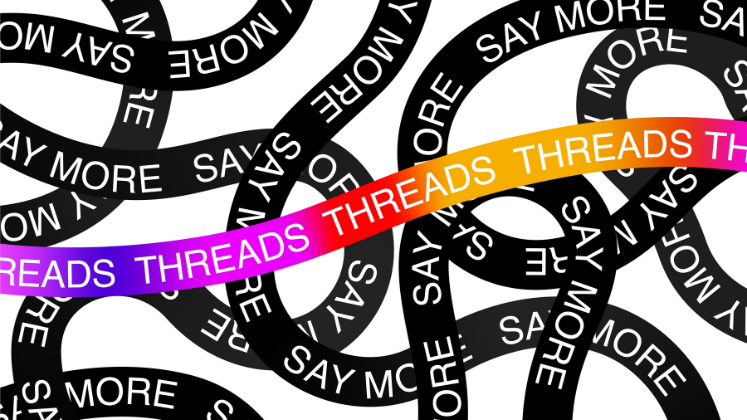The recent launch of Threads, Meta Platform’s (formerly Facebook) answer to X (formerly Twitter), highlights how social media is undergoing a period of reinvention. However, drawing on a recent study of Meta’s corporate messaging around the launch of the Metaverse, Brent Lucia and Matthew Vetter, show how despite rhetorical offers of greater user freedoms, privacy is an increasingly central issue on the platform.
Providing users control, or at least the illusion of control, over their social media identities has become a powerful narrative for Meta Platforms (formerly, Facebook). By centering user agency, Meta attempts to allay the fears of the most vulnerable stakeholders while providing them the allure of individualism.
The latest iteration of this strategy has been Meta’s release of the social media platform Threads. Threads is Meta’s response to twitter, “an app built by the Instagram team for sharing texts.” Threads offers a new space for Instagram users to provide “real-time updates and public conversations” while also promising a unified social media identity across platforms. This may seem minor, but it represents a transition from an era where users are locked into individual social media platforms, to one in which they can move freely across them: a multi-application ecosystem powered by shared infrastructure. Whether or not Meta intends to track users across these applications remains to be seen.
To be clear, Threads isn’t an open ecosystem at present. But, Instagram head Adam Mosseri has said that Threads aims to eventually enable access to an open social media protocol called ActivityPub (which powers the decentralized social media platform Mastodon), and which would allow users to transfer their follow graph and social media identity to a range of other apps. Meta has championed this potential shift to ActivityPub as an opportunity to enhance user agency, while announcing how they are “committed to giving you more control over your audience on Threads.” Meta has also stated that users will manage their own community standards and content moderation policies in these apps, providing people “the freedom to choose spaces that align with their values.”
While Meta has promised 16 billion dollars to “building up the teams and technologies needed to protect users” on Threads, their in-house initiatives to address user privacy concerns have historically fallen flat – some have even been exposed as completely misleading by their own employees. These promises of user control may signal Meta’s public attention to privacy, but they also provide cover, and work to obscure larger privacy issues, such as wide-scale collection and transferring of user data.
This rhetoric follows a pattern we observed and researched in recent years following the launch of the ‘Metaverse’ in 2021. We were especially curious about how the Connect! Conference speech, where Zuckerberg unveiled the Metaverse, was received by journalists and through them – the general public. What were journalists’ initial responses after Zuckerberg introduced the Metaverse? Did they notice any issues with how Zuckerberg frames user identity or privacy, or did they just repurpose his message?

Image Credit: ssi77, Shutterstock.
Looking at 500 different journalists’ artefacts across a variety of genres that directly responded to the announcement (including tech blogs, newspaper and magazine articles), our analysis revealed distinct rhetoric operating within popular discourse that helped to solidify (mostly) or question (less common but certainly present) Meta’s power over the public narrative.
There was a continuous effort by journalists to isolate certain themes presented in Zuckerberg’s speech (user identity, connectivity, and security) while amplifying his position on these themes. For example, there was little to no challenge regarding Zuckerberg’s definition and deployment of the term “connectivity,” (a term Zuckerberg uses to suggest connectivity naturally leads to a better life) or “sharing” (a term that Zuckerberg has used to help depoliticize social and capital relations within the platform). Critique came in limited bunches across many of these themes and most journalists were simply copying and pasting quotes directly from the announcement without questioning their use, essentially providing a platform for Zuckerberg’s framings with little to no pushback.
However, one of the biggest findings was how journalists’ discussed privacy, another major theme in Zuckerberg’s speech. Generally speaking, journalists did not take Zuckerberg’s position on privacy at face value and many pushed back on his claims that Meta was addressing users’ privacy concerns effectively. A significant number of journalists recognized the comprehensive issues related to privacy, such as cyber bullying, data-sharing agreements, and Federal Communications Commission (FCC) regulations, while acknowledging Zuckerberg’s attempt to reconceptualize privacy within a rhetoric of control. While more research needs to be done in relation to Meta’s marketing techniques, we saw these responses as a positive step in how tech journalists cover Meta.
This trend continues with the release of Threads. While attention has been on Threads’ massive user increase and Zuckerberg’s focus on “keeping the platform friendly,” the new platform is currently being postponed in Europe. The European Commission is investigating whether threads runs counter to the EU’s Digital Markets Act, a policy that focuses on sharing user data across different platforms. This follows the recent 1.3 billion dollar fine given to Meta from Ireland’s Data Protection Commission for transferring user data from the EU to the United States. Zuckerberg may champion user control in his language, but the issues surrounding the collection and transferring of user data won’t just disappear, and are exemplified in Meta’s ongoing legal battle between Meta and the EU.
Journalists have also noticed how users’ Threads account cannot be deleted unless they delete their Instagram account. Forcing users to delete their Instagram account to delete Threads seems like an attempt to keep users in the Meta ecosystem, not provide more user flexibility in the Fediverse.
There’s a pattern Meta has developed over the years to keep its audience occupied with other narratives. Some of these stories focus on user control, others on user connectivity or flexibility. Most will center around the user experience while ignoring how the company profits on the backend of that experience. But, as our research shows, journalists are hopefully becoming more aware of Meta’s self-serving rhetoric and their conscious efforts to keep its users in the dark regarding data collection and user surveillance. While we hope these efforts might affect public perception, Meta has shown a talent for being rhetorically flexible and anticipating audience responses.
This post draws on the authors’ paper, Behold the metaverse: Facebook’s Meta imaginary and the circulation of elite discourse, published in New Media and Society.
The content generated on this blog is for information purposes only. This Article gives the views and opinions of the authors and does not reflect the views and opinions of the Impact of Social Science blog (the blog), nor of the London School of Economics and Political Science. Please review our comments policy if you have any concerns on posting a comment below.
Image Credit: ssi77, Shutterstock.







